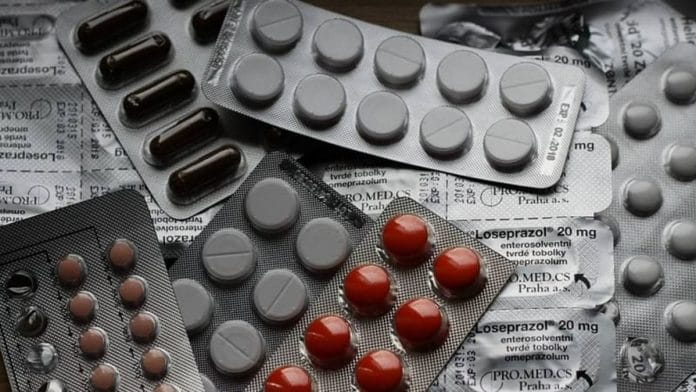New Delhi: It has been close to a week since antiviral drug Molnupiravir was approved by the Central Drugs and Standard Control Organisation (CDSCO) — India’s regulatory body for cosmetics, pharmaceuticals and medical devices — for restricted use on Covid-19 patients in an emergency situation.
However, doctors, having learnt some bitter lessons over the last two years about rushing into new drugs, are still going easy on its use.
There are other concerns too — including its ability to cause mutations in the genetic code of the SARS-CoV-2 virus, which has led to fears about its potential impact on human DNA. Doctors have also expressed concern about the dose: Over a period of five days, a patient needs to have 40 capsules.
“It has not arrived yet. I cannot talk about Molnupiravir because I have not used it on a single patient yet. There are many ups and downs, there are concerns about its effect on connective tissue,” said Dr Anjan Trikha, chairperson of the Clinical Managerial Group, Covid Centre, AIIMS.
“It is also known to cause malignancy in animals. And look at how many capsules the patient needs to have, that is quite a handful. Neither is it a part of the Covid management protocol yet. Antibodies aren’t either, but are still being used in the private sector for a very high cost. It is best to go by protocol,” he added.
According to the US Food and Drug Administration (FDA), Molnupiravir “is a medication that works by introducing errors into the SARS-CoV-2 virus’ genetic code, which prevents the virus from further replicating”. Trial results for the drug have been published in peer-reviewed journals.
The Molnupiravir protocol requires patients to take four 200 mg capsules every 12 hours over a period of five days, making it a total of 40 pills. The full course of the drug costs approximately Rs 3,000.
Use of the drug has been approved in the US, UK, the Philippines, Denmark etc, while many other countries have expressed interest.
Health ministry officials say a call on inclusion of Molnupiravir in the clinical management guidelines will be taken at “an appropriate time, after looking at the evidence”.
Also Read: Molnupiravir helps in faster recovery of mild Covid patients, says Hetero after phase 3 trials
Makers initially promised 50% drop in hospitalisation
American pharmaceutical company Merck, the original manufacturer of Molnupiravir, had initially made claims of 50 per cent reduction in hospitalisation or death in patients. However, the claims in terms of hospitalisation have now been revised to 30 per cent following broader trials.
The drug is now being manufactured in India following regulatory approval last month. Health Minister Dr Mansukh Mandaviya had tweeted on 28 December: “Molnupiravir, an antiviral drug, will now be manufactured in the country by 13 companies…”
Molnupiravir, an antiviral drug, will now be manufactured in the country by 13 companies for restricted use under emergency situation for treatment of adult patients with COVID-19 and who have high risk of progression of the disease. (4/5)
— Dr Mansukh Mandaviya (@mansukhmandviya) December 28, 2021
Although Covid numbers have started going up, not many severe cases are being reported, due to which doctors are taking a slower approach to the adoption of the antiviral medication.
Molnupiravir is contraindicated for use in pregnant women as well as people younger than 18 years because, according to the US FDA, it may affect the growth of bones and cartilage.
“Even in the big centres that are treating Covid… I have used it in only one patient so far — a senior citizen with diabetes and a history of cardiac surgery, who continued to have fever even on day 3. Frankly speaking, I am very strict on the use of the drug. It is known to be mutagenic, so I would not use it on any person of reproductive age group,” said Dr S. Chatterjee, a consultant in the Department of Medicine, Indraprastha Apollo Hospital Delhi.
“One needs to understand that the cases we are seeing right now are quite mild. By the third day, they are almost becoming normal without any medication. We saw what happened during the second wave when a lot of steroids or Remdesivir was used because of family pressure etc, and we paid a heavy price. It is better to avoid such a situation,” added Dr Chatterjee.
During the second wave, overuse of steroids — among other factors — is believed to have contributed to a rise in cases of mucormycosis or black fungus.
‘May help keep people out of hospital if used early enough’
The full course of the drug is around Rs 3,000, but there are expectations that when the output from all companies becomes available, the cost may come down.
That is the reason, said Dr S.P. Byotra, emeritus consultant at Delhi’s Sir Ganga Ram Hospital, that Molnupiravir may be “worthwhile” for India.
“It was tried earlier for various viral diseases like Ebola but in India it has only just arrived. It is for use in mild to moderate cases and is fairly cheap. So, that is why I think it may be worthwhile for us. It is for mild to moderate cases so chances are we can keep people from going to the hospital if we use it early enough,” he added.
One of the reasons for the heavy casualties during the second Covid wave last year was the collapse of health infrastructure in many parts of the country. With scientists stating that the Omicron variant is much more infectious than the Delta variant of the coronavirus, which had largely caused the second wave, there are hopes that the new drug may help avoid a repeat of that situation.
(Edited by Gitanjali Das)
Also Read: Growing plasma, remdesivir use will help Covid virus mutate, become stronger: Ex-ICMR scientist






